-
 Bitcoin
Bitcoin $76,668.4421
-2.61% -
 Ethereum
Ethereum $1,470.4272
-5.48% -
 Tether USDt
Tether USDt $0.9997
0.01% -
 XRP
XRP $1.8226
-4.10% -
 BNB
BNB $549.6664
-0.78% -
 USDC
USDC $0.9999
-0.01% -
 Solana
Solana $104.0810
-2.58% -
 TRON
TRON $0.2312
1.51% -
 Dogecoin
Dogecoin $0.1429
-3.57% -
 Cardano
Cardano $0.5645
-2.20% -
 UNUS SED LEO
UNUS SED LEO $8.9923
0.76% -
 Toncoin
Toncoin $2.9338
-3.36% -
 Chainlink
Chainlink $10.9082
-4.24% -
 Stellar
Stellar $0.2226
-3.92% -
 Avalanche
Avalanche $16.3666
-3.07% -
 Shiba Inu
Shiba Inu $0.0...01075
-5.43% -
 Hedera
Hedera $0.1501
1.11% -
 Sui
Sui $1.9375
-4.25% -
 MANTRA
MANTRA $6.1422
-2.18% -
 Polkadot
Polkadot $3.4442
-4.68% -
 Dai
Dai $1.0001
0.02% -
 Bitcoin Cash
Bitcoin Cash $269.5550
-2.17% -
 Litecoin
Litecoin $68.5837
-3.51% -
 Ethena USDe
Ethena USDe $0.9988
0.02% -
 Bitget Token
Bitget Token $4.0080
-1.74% -
 Pi
Pi $0.5600
-4.25% -
 Monero
Monero $198.4728
-0.78% -
 Hyperliquid
Hyperliquid $10.8363
-2.45% -
 Uniswap
Uniswap $4.9087
-3.82% -
 OKB
OKB $48.9891
-4.48%
How does NFT Regulatory Compliance ensure the legality of NFTs?
NFT legality is complex and jurisdiction-specific, demanding creators and buyers conduct thorough due diligence. Compliance requires navigating securities, tax, AML/KYC, and consumer protection laws, necessitating continuous monitoring of evolving regulations.
Mar 03, 2025 at 07:36 am
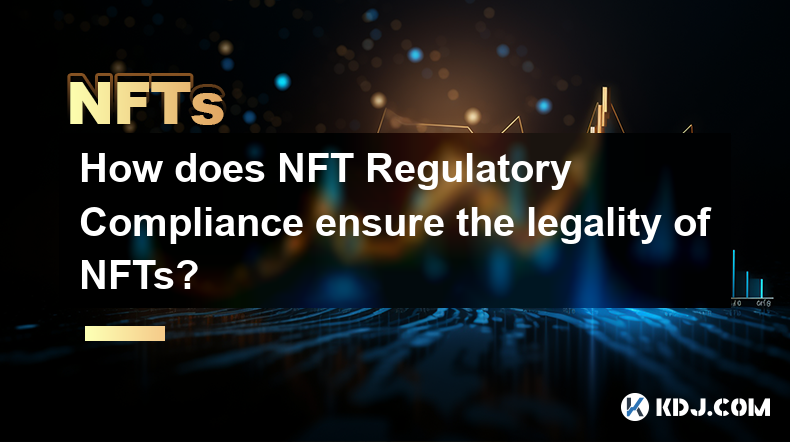
Key Points:
- NFT legality is complex and varies significantly by jurisdiction.
- Regulatory compliance focuses on mitigating risks related to securities laws, tax laws, money laundering, and consumer protection.
- Due diligence is crucial for both NFT creators and buyers to avoid legal issues.
- Understanding the specific legal landscape of your target market is paramount.
- Ongoing changes in regulations require continuous monitoring and adaptation.
How Does NFT Regulatory Compliance Ensure the Legality of NFTs?
The explosive growth of Non-Fungible Tokens (NFTs) has brought a wave of excitement and innovation, but also significant regulatory uncertainty. Determining the legality of NFTs isn't straightforward, as their nature blurs the lines between various legal categories. Ensuring compliance requires a multifaceted approach that addresses several key areas.
Securities Laws and NFTs: One of the most significant legal hurdles is the potential classification of certain NFTs as securities. If an NFT represents an investment contract offering a share in profits or a return on investment, it may fall under the purview of securities laws. This requires registration with relevant regulatory bodies and adherence to strict disclosure requirements. Failure to comply can result in substantial penalties.
Tax Implications of NFTs: The sale and transfer of NFTs trigger tax implications for both creators and buyers. Depending on the jurisdiction and the specific circumstances, taxes may be levied on capital gains, royalties, or other transactions involving NFTs. Accurate record-keeping and compliance with tax laws are essential to avoid legal repercussions.
Anti-Money Laundering (AML) and Know Your Customer (KYC) Regulations: The anonymity associated with some NFT marketplaces raises concerns about money laundering. Regulatory bodies are increasingly focusing on implementing AML and KYC measures to trace the flow of funds and prevent illicit activities. This often involves verifying the identities of users and monitoring transactions for suspicious patterns.
Consumer Protection Laws: Many jurisdictions have consumer protection laws designed to prevent fraud and misleading practices. NFT projects must ensure that their marketing materials are accurate and transparent, and that they don't make false or misleading claims about the value or utility of their NFTs. Misrepresentation or deceptive practices can lead to legal challenges and reputational damage.
Intellectual Property Rights: The creation and sale of NFTs often involve intellectual property rights, such as copyrights and trademarks. It's crucial to ensure that the underlying assets used to create NFTs are legally owned and that the rights to use and distribute them are properly secured. Infringement of intellectual property can result in lawsuits and substantial financial penalties.
Due Diligence for NFT Creators:
- Legal Counsel: Consult with experienced legal professionals specializing in blockchain and NFT law to understand the relevant regulations in your target jurisdictions.
- Clear Terms of Service: Develop comprehensive terms of service that clearly outline the rights and responsibilities of all parties involved.
- Transparent Disclosure: Provide accurate and transparent information about the NFTs, their utility, and any associated risks.
- Compliance with Applicable Laws: Ensure that your NFT project complies with all relevant securities laws, tax laws, AML/KYC regulations, and consumer protection laws.
Due Diligence for NFT Buyers:
- Research the Project: Thoroughly research the NFT project and its creators to assess their legitimacy and track record.
- Understand the Legal Implications: Understand the potential tax implications and other legal consequences of purchasing NFTs.
- Verify Ownership: Verify that the seller actually owns the NFT and has the right to sell it.
- Review the Terms of Service: Carefully review the terms of service associated with the NFT purchase.
Jurisdictional Variations: The regulatory landscape for NFTs is still evolving, and it varies significantly from one jurisdiction to another. Some countries have embraced a more proactive approach to regulation, while others are still developing their regulatory frameworks. This necessitates a careful evaluation of the legal environment in each target market.
Ongoing Monitoring and Adaptation: The regulatory landscape for NFTs is constantly changing. Staying informed about the latest developments and adapting your practices accordingly is crucial for maintaining compliance. Regularly reviewing and updating your legal strategies is essential to navigate this dynamic environment.
Common Questions and Answers:
Q: Are all NFTs considered securities?
A: No, not all NFTs are considered securities. The determination depends on whether the NFT represents an investment contract, offering a share in profits or a return on investment. This is a complex legal assessment.
Q: What are the tax implications of selling an NFT?
A: The tax implications vary by jurisdiction. Generally, profits from selling an NFT are considered capital gains and are subject to capital gains taxes. Specific rules and rates differ across jurisdictions. Consult a tax professional for accurate guidance.
Q: How can I ensure my NFT project complies with AML/KYC regulations?
A: Implementing robust KYC procedures, such as verifying user identities and monitoring transactions for suspicious activity, is crucial. Partnering with reputable KYC/AML service providers can assist in compliance.
Q: What happens if my NFT project violates regulations?
A: Penalties can range from fines and legal action to reputational damage and potential criminal charges. The severity depends on the nature and extent of the violation and the applicable jurisdiction.
Q: How can I protect my intellectual property rights when creating and selling NFTs?
A: Secure appropriate copyright and trademark protection for your underlying assets. Clearly define the rights granted to NFT holders in your terms of service. Consult with an intellectual property lawyer for guidance.
Q: Are there any international standards for NFT regulation?
A: Currently, there are no universally accepted international standards for NFT regulation. However, various international organizations are working on developing guidelines and best practices. The regulatory landscape is rapidly evolving on a global scale.
Disclaimer:info@kdj.com
The information provided is not trading advice. kdj.com does not assume any responsibility for any investments made based on the information provided in this article. Cryptocurrencies are highly volatile and it is highly recommended that you invest with caution after thorough research!
If you believe that the content used on this website infringes your copyright, please contact us immediately (info@kdj.com) and we will delete it promptly.
- U.S. Securities and Exchange Commission (SEC) Closes Its Investigation into Immutable X (IMX) Without Providing an Explanation
- 2025-04-09 00:50:12
- Solaxy Price Prediction – As Solana’s First Layer-2 Scaling Solution, SOLAXY Might Speed Up Transactions and Cut Fees
- 2025-04-09 00:50:12
- Troller Cat ($TCAT): The Next Big Meme Coin?
- 2025-04-09 00:45:12
- JA Mining cloud mining will help you easily mine Bitcoin in 2025
- 2025-04-09 00:45:12
- Chainlink (LINK) May Enter a Bullish Trend Within the Next One to Two Weeks
- 2025-04-09 00:40:12
- Charles Hoskinson to Moderate a Panel Discussion Featuring Donald Trump Jr.
- 2025-04-09 00:40:12
Related knowledge
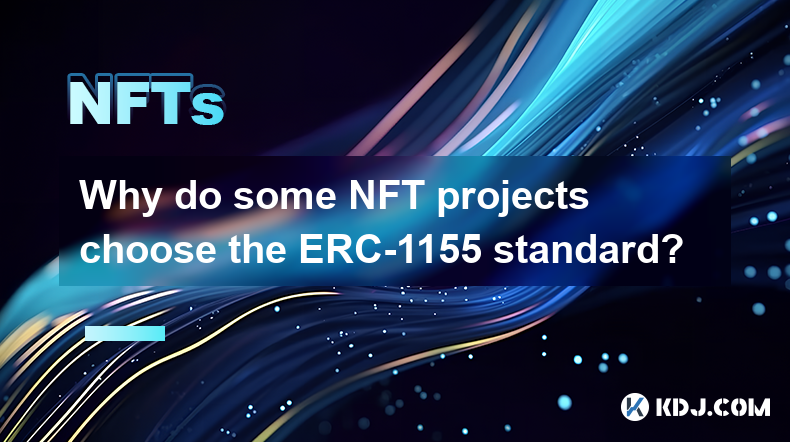
Why do some NFT projects choose the ERC-1155 standard?
Apr 08,2025 at 11:49am
The world of Non-Fungible Tokens (NFTs) has seen a significant rise in popularity and innovation, leading to the development of various token standards. Among these, the ERC-1155 standard has emerged as a versatile and efficient choice for many NFT projects. This article delves into the reasons why some NFT projects opt for the ERC-1155 standard, explor...
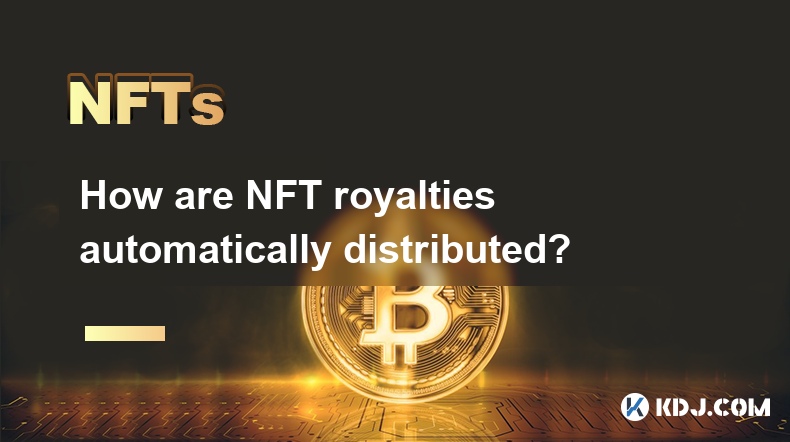
How are NFT royalties automatically distributed?
Apr 08,2025 at 08:14pm
NFTs, or Non-Fungible Tokens, have revolutionized the digital art and collectibles market by providing a way to prove ownership and authenticity of digital assets. One of the most intriguing features of NFTs is the ability to automatically distribute royalties to creators whenever their work is resold. This article will delve into the mechanisms behind ...
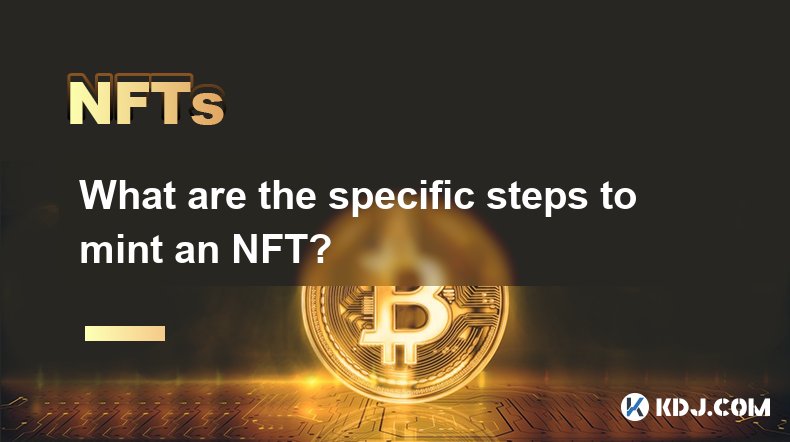
What are the specific steps to mint an NFT?
Apr 08,2025 at 05:22pm
Introduction to NFT MintingMinting an NFT, or Non-Fungible Token, involves creating a unique digital asset on a blockchain. This process allows artists, creators, and collectors to tokenize their work, ensuring its authenticity and ownership. Understanding the steps to mint an NFT is crucial for anyone looking to enter the world of digital collectibles....
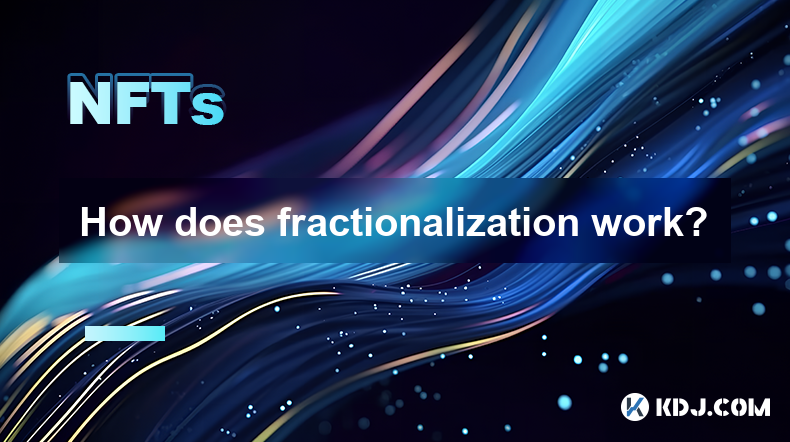
How does fractionalization work?
Apr 08,2025 at 07:42pm
How does fractionalization work? Fractionalization in the context of cryptocurrencies and blockchain technology refers to the process of dividing a single asset into smaller, more manageable pieces. This concept has revolutionized the way investors and users interact with high-value assets, making them more accessible and liquid. In this article, we wil...
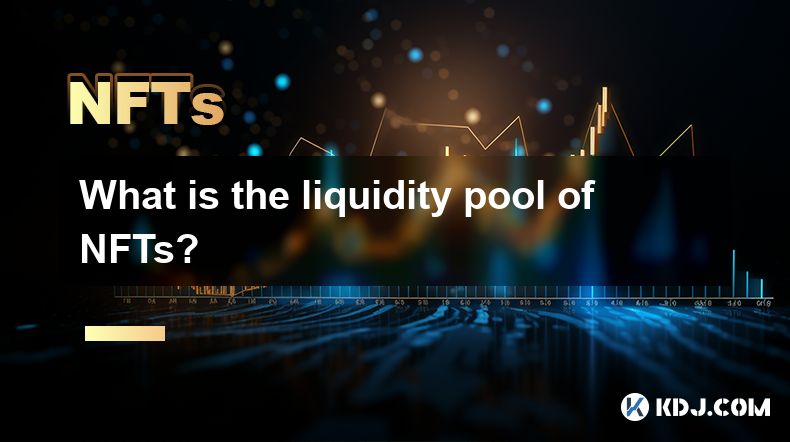
What is the liquidity pool of NFTs?
Apr 08,2025 at 05:35pm
The concept of liquidity pools has become increasingly popular within the cryptocurrency and decentralized finance (DeFi) ecosystems. While traditionally associated with token swaps, the idea has extended to the realm of Non-Fungible Tokens (NFTs). Liquidity pools for NFTs are mechanisms that facilitate the trading and exchange of these unique digital a...
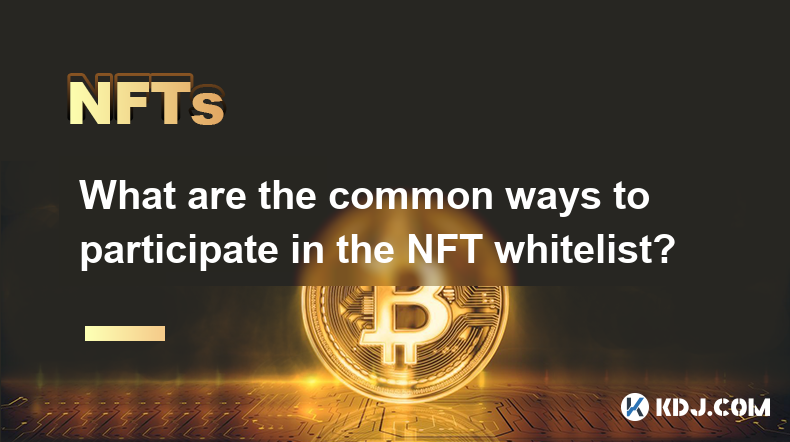
What are the common ways to participate in the NFT whitelist?
Apr 08,2025 at 08:28pm
Participating in an NFT whitelist can be an exciting opportunity for enthusiasts and investors looking to secure their spot in upcoming NFT drops. The whitelist often grants early access or special privileges, such as lower minting fees or guaranteed allocations. Here, we will explore the common ways to participate in an NFT whitelist, detailing each me...

Why do some NFT projects choose the ERC-1155 standard?
Apr 08,2025 at 11:49am
The world of Non-Fungible Tokens (NFTs) has seen a significant rise in popularity and innovation, leading to the development of various token standards. Among these, the ERC-1155 standard has emerged as a versatile and efficient choice for many NFT projects. This article delves into the reasons why some NFT projects opt for the ERC-1155 standard, explor...

How are NFT royalties automatically distributed?
Apr 08,2025 at 08:14pm
NFTs, or Non-Fungible Tokens, have revolutionized the digital art and collectibles market by providing a way to prove ownership and authenticity of digital assets. One of the most intriguing features of NFTs is the ability to automatically distribute royalties to creators whenever their work is resold. This article will delve into the mechanisms behind ...

What are the specific steps to mint an NFT?
Apr 08,2025 at 05:22pm
Introduction to NFT MintingMinting an NFT, or Non-Fungible Token, involves creating a unique digital asset on a blockchain. This process allows artists, creators, and collectors to tokenize their work, ensuring its authenticity and ownership. Understanding the steps to mint an NFT is crucial for anyone looking to enter the world of digital collectibles....

How does fractionalization work?
Apr 08,2025 at 07:42pm
How does fractionalization work? Fractionalization in the context of cryptocurrencies and blockchain technology refers to the process of dividing a single asset into smaller, more manageable pieces. This concept has revolutionized the way investors and users interact with high-value assets, making them more accessible and liquid. In this article, we wil...

What is the liquidity pool of NFTs?
Apr 08,2025 at 05:35pm
The concept of liquidity pools has become increasingly popular within the cryptocurrency and decentralized finance (DeFi) ecosystems. While traditionally associated with token swaps, the idea has extended to the realm of Non-Fungible Tokens (NFTs). Liquidity pools for NFTs are mechanisms that facilitate the trading and exchange of these unique digital a...

What are the common ways to participate in the NFT whitelist?
Apr 08,2025 at 08:28pm
Participating in an NFT whitelist can be an exciting opportunity for enthusiasts and investors looking to secure their spot in upcoming NFT drops. The whitelist often grants early access or special privileges, such as lower minting fees or guaranteed allocations. Here, we will explore the common ways to participate in an NFT whitelist, detailing each me...
See all articles






















































































